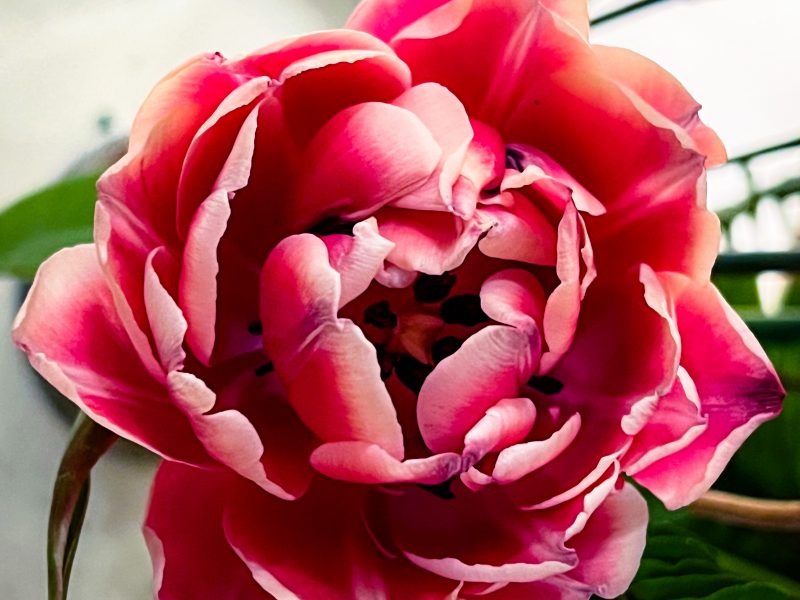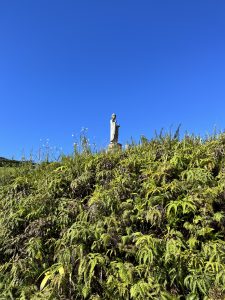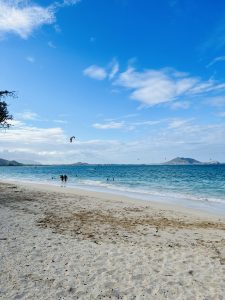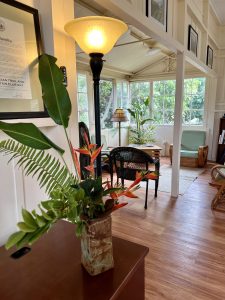The Clubhouse Chronicles: This Year Out of Time

Bio: Malia, Josh, and Mehana Collins are the current live-in residents at the HTMC clubhouse. Malia was born and raised in Maunawili and has always talked about moving back home. She started writing a series on moving to and living at the clubhouse. This is the final installment.
The Year Out of Time
I keep track of big dates in our life by remembering a story or anticipating a new one—“this time last week,” I’ll say, “or at this time next year . . . .” Sometimes, the remembering is joyful (this time next week we’ll be having dinner with Max in Claremont, California), and sometimes it can break my heart (this year is our first Thanksgiving without Max here with us, our first time in Hawaii for the holidays since my father died). Remembering this way makes time and distance close in, it’s how I bring those I miss into the time and space with me.
This morning I sat zazen on the lanai outside of the dojo in the same spot I’ve been sitting every Saturday morning since we moved home at the beginning of June. Across the rock path from where I sit is a hillside covered in uluhe and kupukupu ferns. When the wind blows through Kalihi Valley, the fronds shift and settle almost as if the whole place is taking a deep breath. Last spring, a patch of hillside, maybe six feet across and ten feet high, was burned out, a small mishap during a workday, and there was talk that first day at the dojo whether or not the ferns would grow back. The spot, a dark orange and ash-colored scar in the hillside, was all I could see when I sat. I barely paid attention to the statue of Buddha at the top of the hill, or the bell, or the stream I could hear but not see—I was fixated on that one spot, so out of place in the order of the rest of the space, where I’ve picked tiny weeds by hand, where everything is tended to, taken care of, and loved.
My father was a worker and growing up, he was always doing something—his job during the week, working around the house and in the yard on the weekends. When he started his own company and brought my mother in to help, they went into the office on Sundays. To deal with the kids, they they dropped us off at Kawaiha’o Church before the early service, gave us each a quarter for the offering plate, and picked us up late in the afternoon. We went to Sunday school, then church, then lunch, and then walked around downtown. One Sunday my youngest brother took a handful of quarters from his pocket and treated us each to a soda from the vending machine. For a month of Sundays, he kept his quarters instead of putting them in the offering plate. I drank that cold Coke with both fear and delight.
On holidays, my father gave himself permission to take off completely. We’d pile into the car and drive to Kailua Beach, park in the second parking lot, and set up to the right of the lifeguard stand. My dad would sit in his chair, with a package of David’s sunflower seeds, a koozie, and a cooler of Budweiser beer. It was the only time I didn’t see him moving. When he got his first cellphone, the giant brick one with the stubby black antenna, he called his folks on the mainland, his friends on the eastern seaboard and said—ask me where I am. That was Thanksgiving and Christmas Day for me, all of us at the beach, my father on his cellphone, that question—ask me where I am. Nobody loved Hawaii more than my dad.
My dad would have loved coming over to the clubhouse. He loved a project, a chore, fixing things, making things better. He was an engineer and brought that engineering mind to everything he did. There are so many moments when I want to call him and ask for his advice—what do we do about the coffee maker that shuts off four times while it’s brewing, or the best way to get rid of the flies in the grass. He would have loved having us live here, and would have found any excuse he could to drive out to the country, take his chair down to the beach, talk story with his granddaughter.
There is a character in Zen calligraphy, myo, that means mysterious wonder. So many things have to align to get to this feeling: clarity, presence in this moment, an unmovable mind. I am never alone at the clubhouse at night, but tonight I’m here, writing this final essay for the HTMC monthly newsletter. I already feel wistful for the strangeness of this year out of time, living in this shared space after living in our own home for twenty-three years, the hard moments and then those filled with what I would call mysterious wonder. Josh and Mehana pull up outside, and I hear her open and close the gate, her voice rising above the coconut trees and into the kitchen windows, calling out she’s home. Sitting here, I feel the mysterious wonder of her, all of the things that had to align for the sound of her voice to be in the middle of this very moment. This time next year, she’ll be away on her own adventure, and we’ll be somewhere else, too. How wild it is all of us waiting to find out what will happen next. This is our wilderness. It is also our leap.
Last week, during the drop in writing workshop at the clubhouse, we wrote to a prompt based on the poem, “What the Living Do,” by Marie Howe, a poet I adore. The poem is written as a conversation with her brother, in the middle of the moment she’s in, where she lists the ordinary things she does throughout the day, the things the living do, the trips to the grocery store, the car repair shop, fixing the backed up kitchen sink. In the middle of these big moments, I can forget what the living do, so focused on preparing for what’s next, without know what’s next. I keep reminding myself—pay attention.
The uluhe and kupukupu ferns have started filling in the burned spot on the hillside at the dojo. We are closing in on our time as the clubhouse residents. The seasons are shifting and with the waves roaring and high tide coming up over the sand and onto the grass at the edge of the beach access, winter has arrived. What if this is what the living do; find a way to fill up the empty space, to bloom in an unexpected spot. To weather so many changes, and embrace both the good and difficult that comes with clubhouse living. I wish my father could see us in this life, be close enough for me to call him and say into the phone—ask me where I am. And he would answer.



